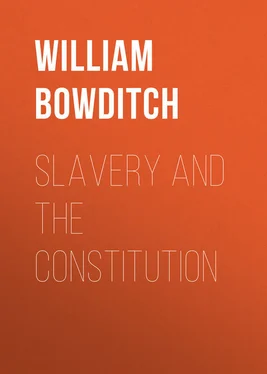William Bowditch - Slavery and the Constitution
Здесь есть возможность читать онлайн «William Bowditch - Slavery and the Constitution» — ознакомительный отрывок электронной книги совершенно бесплатно, а после прочтения отрывка купить полную версию. В некоторых случаях можно слушать аудио, скачать через торрент в формате fb2 и присутствует краткое содержание. ISBN: , Жанр: foreign_antique, foreign_prose, на английском языке. Описание произведения, (предисловие) а так же отзывы посетителей доступны на портале библиотеки ЛибКат.
- Название:Slavery and the Constitution
- Автор:
- Жанр:
- Год:неизвестен
- ISBN:http://www.gutenberg.org/ebooks/38716
- Рейтинг книги:4 / 5. Голосов: 1
-
Избранное:Добавить в избранное
- Отзывы:
-
Ваша оценка:
- 80
- 1
- 2
- 3
- 4
- 5
Slavery and the Constitution: краткое содержание, описание и аннотация
Предлагаем к чтению аннотацию, описание, краткое содержание или предисловие (зависит от того, что написал сам автор книги «Slavery and the Constitution»). Если вы не нашли необходимую информацию о книге — напишите в комментариях, мы постараемся отыскать её.
Slavery and the Constitution — читать онлайн ознакомительный отрывок
Ниже представлен текст книги, разбитый по страницам. Система сохранения места последней прочитанной страницы, позволяет с удобством читать онлайн бесплатно книгу «Slavery and the Constitution», без необходимости каждый раз заново искать на чём Вы остановились. Поставьте закладку, и сможете в любой момент перейти на страницу, на которой закончили чтение.
Интервал:
Закладка:
"No person shall keep or teach any school for the instruction of negroes or mulattoes in reading or writing in this State."
Other similar laws might be produced; but these suffice to exhibit, in a clear light, the opportunities presented for the mental instruction of slaves! In some States, it is unlawful to teach even a FREE colored person to read or write!
That these laws have been almost universally respected and obeyed, there is no room to doubt. No one has given more attention to this subject than the Rev. Chas. C. Jones, of Savannah, Ga. In 1842 he published, at Savannah, a work, containing the result of his researches, entitled "The Religious Instruction of the Negroes in the United States." In this work, p. 115, he says, "The statutes of our respective Slave States forbid all knowledge of letters to the negroes; and, where the statutes do not, custom does. It is impossible to form an estimate of the number of negroes that read . My belief is, that the proportion would be expressed by AN ALMOST INCONCEIVABLE FRACTION. The greatest number of readers is found in and about towns and cities, and among the FREE negro population some two or three generations removed from servitude." – As a confirmation of this testimony of Mr. Jones, we know no greater proof that the degraded class in any community is almost wholly uneducated, than that a large portion of the privileged class is so. The law of compensation is divine. We cannot degrade or brutalize our fellow-men, without degrading or brutalizing ourselves. Now, we find that, in the Slave States, almost one tenth of the free white population over twenty years of age are unable to read and write! To some persons this may seem a small proportion; but, in the Free States, with all our ignorance, there are less than one in one hundred and fifty! and Horace Mann, the best authority on this subject, says that "at least four fifths of these are foreigners, who ought not to be included in the computation." In Connecticut, out of 163,843 free persons over twenty years of age, there are only 526 who are unable to read and write; while, in the model Slave State of South Carolina, out of only 111,663 free white persons over twenty years of age, there are 20,615 who cannot read and write! "In South Carolina," says Theodore Parker, "out of each 626 free whites more than twenty years of age, there are more than 58 wholly unable to read or write; out of that number of such persons in Connecticut, not quite two"! More than the sixth part of the adult freemen of South Carolina are unable to read the vote they deposit in the ballot-box! And Gov. Clarke, of Kentucky, declared in his message to the legislature in 1837, that one third of the adult population of that State were unable to write their names! While such is the state of the freemen, it is impossible that any considerable number of the slaves should become educated. With these facts before us, it is impossible not to admit the correctness of Mr. Jones's conclusion. Only an "almost inconceivable fraction" of three millions of slaves can read or write! These are taught by their owners, or with their connivance; and of them we shall speak hereafter. But, taken as a mass, the slaves are truly described by a writer in the "Marysville (Tennessee) Intelligencer" as being "degraded, stupid savages." We may add, not naturally degraded and stupid, but made and kept so in open violation of their rights as human beings, for the sake of gain!
CHAPTER III.
MORAL AND RELIGIOUS CONDITION OF THE SLAVES
"Their depravity, their spiritual ignorance and destitution, are amazingly and awfully great." — Rev. C. C. Jones's Catechism ; preface , p. 4.
"When the charge of the intellectual and moral degradation of the slaves is preferred against us," says Mr. Jones [B] Конец ознакомительного фрагмента. Текст предоставлен ООО «ЛитРес». Прочитайте эту книгу целиком, купив полную легальную версию на ЛитРес. Безопасно оплатить книгу можно банковской картой Visa, MasterCard, Maestro, со счета мобильного телефона, с платежного терминала, в салоне МТС или Связной, через PayPal, WebMoney, Яндекс.Деньги, QIWI Кошелек, бонусными картами или другим удобным Вам способом.
("Religious Instruction," p. 107), "we are inclined to put the best face on affairs, knowing that this is the darkest feature and the most vulnerable point."
"Their notions of the Supreme Being (ib. p. 125); of the character and offices of Christ and of the Holy Ghost; of a future state; and of what constitutes holiness of life, are indefinite and confused. Some brought up in a Christian land, and in the vicinity of the house of God, have heard of Jesus Christ; but who he is, and what he has done for a ruined world, they cannot tell. The Mohammedan Africans remaining of the old stock of importations, although accustomed to hear the gospel preached, have been known to accommodate Christianity to Mohammedanism. 'God,' say they, 'is Allah, and Jesus Christ is Mohammed: the religion is the same; but different countries have different names.'"
"True religion they are inclined to place in profession, in forms and ordinances, and in excited states of feeling; and true conversion, in dreams, visions, trances, voices, – all bearing a perfect or striking resemblance to some form or type which has been handed down for generations, or which has been originated in the wild fancy of some religious teacher among them." Page 126: "Sometimes principles of conduct are adopted by church members at so much variance with the gospel that the 'grace of God is turned into lasciviousness.' For example, that which would be an abominable sin, committed by a church member with a worldly person, becomes no sin at all if committed with another church member. The brethren must 'bear one another's burdens, and so fulfil the law of Christ.'… To know the extent of their ignorance, even where they have been accustomed to the sound of the gospel in white churches, a man should make investigation for himself: the result will frequently surprise and fill him with grief. They scarcely feel shame for their ignorance on the subject of religion, although they may have had abundant opportunity of becoming wiser. Ignorance they seem to feel is their lot; and that feeling is intimately associated with another, every way congenial to the natural man, namely, a feeling of irresponsibility: ignorance is a cloak and excuse for crime." Page 127: "He who carries the gospel to them encounters depravity, intrenched in ignorance, both real and pretended. He beholds the Scripture fulfilled, 'Having the understanding darkened, being alienated from the life of God through the ignorance that is in them, because of the hardness of their hearts,' Eph. iv. 17-19. He discovers deism (!), scepticism (!!), universalism (!!!)… 'They are wise to do evil; but to do good they have no knowledge.'"
"Intimately connected with their ignorance is their superstition. They believe in second sight, in apparitions, charms, witchcraft, and in a kind of irresistible Satanic influence. The superstitions brought from Africa have not been wholly laid aside (p. 128). Ignorance and superstition render them easy dupes to their teachers, doctors, prophets, conjurers; to artful, designing men. When fairly committed to such leaders, they may be brought to the commission of almost any crime. Facts in their history prove this. On certain occasions, they have been made to believe, that, while they carried about their persons some charm with which they had been furnished, they were invulnerable . [C] Конец ознакомительного фрагмента. Текст предоставлен ООО «ЛитРес». Прочитайте эту книгу целиком, купив полную легальную версию на ЛитРес. Безопасно оплатить книгу можно банковской картой Visa, MasterCard, Maestro, со счета мобильного телефона, с платежного терминала, в салоне МТС или Связной, через PayPal, WebMoney, Яндекс.Деньги, QIWI Кошелек, бонусными картами или другим удобным Вам способом.
They have, on certain other occasions, been made to believe that they were under a protection that rendered them invincible… They have been known to be so perfectly and fearfully under the influence of some leader or conjurer or minister, that they have not dared to disobey him in the least particular; nor to disclose their own intended or perpetrated crimes, in view of inevitable death itself; notwithstanding all other influences brought to bear upon them."
Интервал:
Закладка:
Похожие книги на «Slavery and the Constitution»
Представляем Вашему вниманию похожие книги на «Slavery and the Constitution» списком для выбора. Мы отобрали схожую по названию и смыслу литературу в надежде предоставить читателям больше вариантов отыскать новые, интересные, ещё непрочитанные произведения.
Обсуждение, отзывы о книге «Slavery and the Constitution» и просто собственные мнения читателей. Оставьте ваши комментарии, напишите, что Вы думаете о произведении, его смысле или главных героях. Укажите что конкретно понравилось, а что нет, и почему Вы так считаете.












